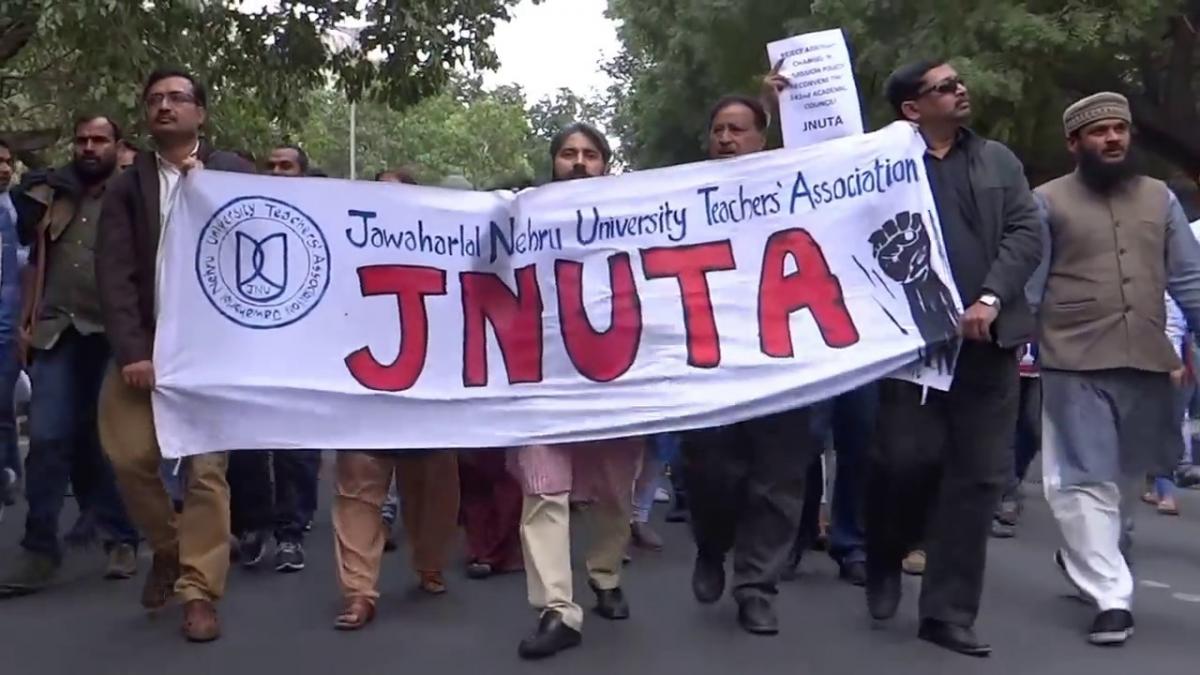Earlier this week, it stayed a circular issued by the JNU administration last year mandating that faculty members mark their own attendance or submit attendance records of their students failing which any of their proposal or leave request will not be considered.

File photo
New Delhi: The Delhi high court Friday stayed the mandatory marking of attendance for teachers of Jawaharlal Nehru University (JNU) as decided by the academic and the executive council in July last year. The court stated that action against teachers for irregular attendance can be taken in accordance with laid down rules.
“..decision taken on July 13, 2018, in 146 A meeting of the Academic Council qua item ‘any other’, and approval of Executive Council dated August 23, 2018, in minutes of 275th meeting qua item 6.9 shall remain stayed,” Justice Suresh Kait said.
“Any subsequent decisions/proceedings pursuant to the decision taken in the two meetings have also been stayed by the court,” he added.
Earlier this week, it stayed a circular issued by the JNU administration last year mandating that faculty members mark their own attendance or submit attendance records of their students failing which any of their proposal or leave request will not be considered.
On Friday, the court said the varsity can take action against the teaching staff who go on unauthorised leave, according to the rules prevalent before the AC decision of July 13, 2018, making marking of attendance mandatory.
The interim order by Justice Suresh Kait comes close on the heels of his January 14 direction staying a circular of the Jawaharlal Nehru University administration, which had it mandatory for the teaching staff to mark their attendance once a day.
The court, granting interim relief to the petitioner, JNU professor Ayesha Kidwai, also issued a notice to JNU on her plea challenging the decisions of the Academic Council (AC) and Executive Council (EC) of the university and listed the matter for further hearing on May 3.
The court’s order came while hearing a plea by two faculty members — Ayesha Kidwai and Pratiksha Baxi— who had challenged the mandatory marking of attendance. The HC also sought the response of the varsity on the plea.
On Friday, the single judge bench said the university can act against teachers going on unauthorised leave, according to the rules prevalent before the decision of marking attendance was made mandatory.
Appearing for Kidwai, senior advocate Dhruv Mehta informed the court that the two councils did not follow proper procedure while taking the decision. Linking it to the privacy of a person, he said asking for biometrics amounted to breach of privacy of an individual.
Countering this, advocate Monika Arora, standing counsel for the Centre, submitted that if marking of attendance was not mandatory, then it would be difficult to ensure the presence of the teaching faculty as many of them go on vacation for months together. She also alleged that several students have complained about the long-term absence of teaching staff.
JNU teachers association (JNUTA) welcomed the decision. “JNUTA has been continuously pointing out that the decision-making processes in JNU under the current management has been marred by procedural violations and goes against the spirit of democratic governance that are critical requirements for a university. JNUTA is glad that this is being increasingly recognised and we are hopeful that with the support of the public at large, the process of destruction of a public university unleashed by the current administration will be stalled and reversed,” JNUTA secretary Avinash Kumar said.
Around the first week of January, the JNU administration had slammed JNUTA for seeking the opinion of colleagues from foreign universities on compulsory attendance for faculty members “just to oppose the administration.”
The JNU Teachers’ Association (JNUTA) had recently shared findings of a survey conducted by them among universities across the world to obtain views on the marking of attendance for faculty, Kumar had said.
“No university/institutes of higher learning in 75 premiere and highly ranked universities across 21 countries except one, has the practice of faculty signing daily attendance register or using biometrics,” he said.
The JNUTA surveyed 32 universities in Europe, 27 in USA and Canada and 16 in other parts of the world.
Some of the universities surveyed in Europe included the University of Oxford, London School Of Economics, University of Cambridge, Kings College, London, Berlin School Of Economics and Law, which replied in the negative to JNUTA’s queries, according to the report.
JNUTA also received responses from 27 premiere public funded and private universities spread across the USA and Canada like Columbia University, Stanford University, Ohio State University, Indiana University, all of which said they do not practice the policy of marking attendance of the faculty using daily attendance register or biometrics.
“At the time of the February 9, 2016, incident, when alleged anti-India slogans were raised on campus, police had entered the campus to arrest then JNUSU president Kanhaiya Kumar. In the years that followed, the Administrative Block has become off limits for protests, and of late, JNUSU representatives say they are no longer invited to AC meetings,” Indian Express reported.
The Economist published a report about how JNU has seen a sea change in the last few years under the new VC and not all of it was good.